On the 27th of July 2022, afternoon, a seminar on "Metaverse Ethics: A New Time and Space Based Off Balanced Development" was successfully held online, with a total of eight experts and scholars from China, Japan and Singapore delivering keynote speeches and carrying out discussions on the development and ethics of the Metaverse.
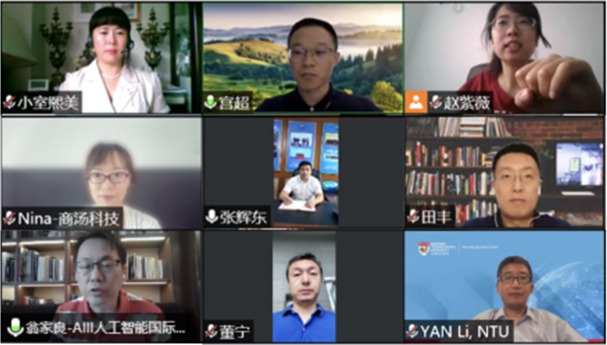
Photo: Seminar on "Metaverse Ethics: A New Space and Time Based Off Balanced Development”
The seminar was organized and delivered by the China Committee of 100 of Digital Economy, the World Federation of Engineering Organizations (WFEO), the Tech4SDG Alliance, SenseTime, the APEC SME Informatization Promotion Centre, and co-organized by the Japan Meta-Universe International Association.
In Zhang Huidong speech, he said that the APEC Leaders' Declaration, the Joint Ministerial Statement and the Roadmap for the Internet and Digital Economy have laid a solid foundation for the development of the metaverse in terms of policy and development. He stressed that APEC economies welcome and enjoy the innovation and development of the metaverse. While the metaverse brings joy, opportunity and development to children, women, medium to small enterprises and the society, major ethical issues such as harassment, infringement and abuse of power that arise in the metaverse would need to be addressed.
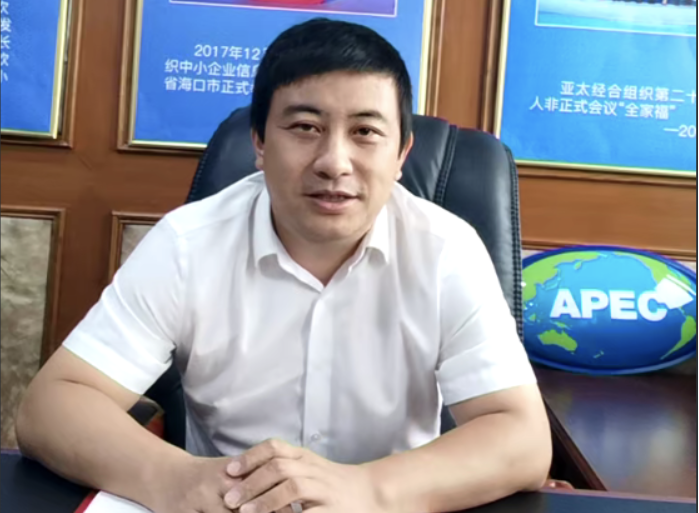
Photo: Speech by Director Zhang Huidong
Luan Qing, the General Manager of Digital Entertainment Division, Digital Space Business Group, SenseTime, delivered a keynote speech on the "AI Engine of the Metaverse". Luan Qing introduced the metaverse system hierarchy and said that the current 5G network, smart computing center and VR/AR hardware and software technology are all under construction and development. When the infrastructure matures, a new round of Internet revolution will burst into life and the "metaverse" with 3D panoramas as the main core will become a new industrial trend. Luan Qing introduced the three directions taken by SenseTime's SenseMARS platform, which includes Avatar character virtualization, digital human avatars and 3D reconstruction of scenes.
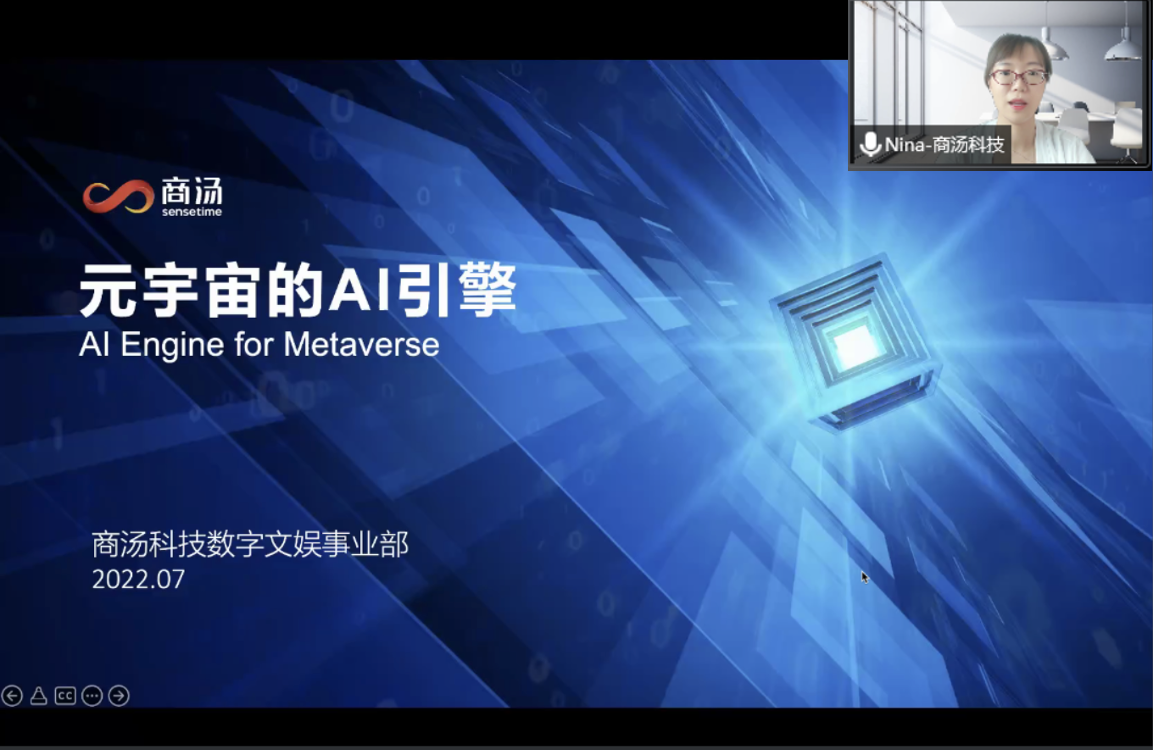
Photo: General Manager Luan Qing's keynote speech
Yan Li, the Vice President of Singapore Blockchain Association and Professor of Nanyang Technological University, delivered a keynote speech on "Design Thinking and Business Model for Innovation in the Metaverse". Yan Li introduced different definitions of the metaverse by different scholars and argued that the metaverse in the future is a large integration of various sub metaverses. He suggested that the metaverse has ethical issues of data privacy protection, digital empire, and digital hegemony, therefore the social governance structure should keep up with technological progress. In addition, Yan Li specifically mentioned blockchain as the core technology of the meta-universe.
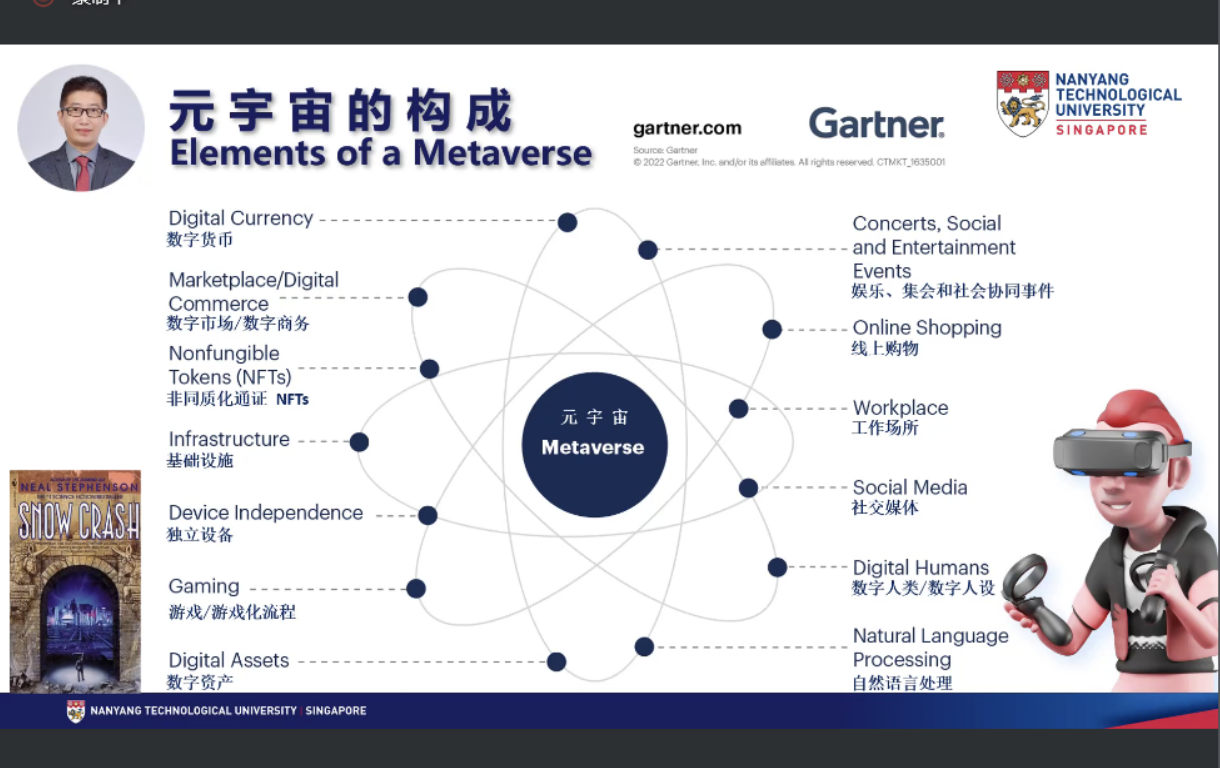
Photo: Professor Yan Li's keynote speech
Dong Ning, chief expert of blockchain at China Mobile Research Institute, delivered a keynote speech on "Talking about the core technologies of the metaverse and the new business paradigm empowerment". Dong Ning introduced the six supporting technologies of the original universe, where blockchain is one of the key technologies for the development of the metaverse. It drives the development of Web3.0, the core business paradigm of the metaverse. Conversely, the ultimate service target of Web3.0 is the metaverse. He stressed that the ethical and moral principles of the Web should be in line with the freedom, openness and sharing of the mainstream model of the web, while the ethical issues during the metaverse era is how to move from online to offline and the web to the everyday process.
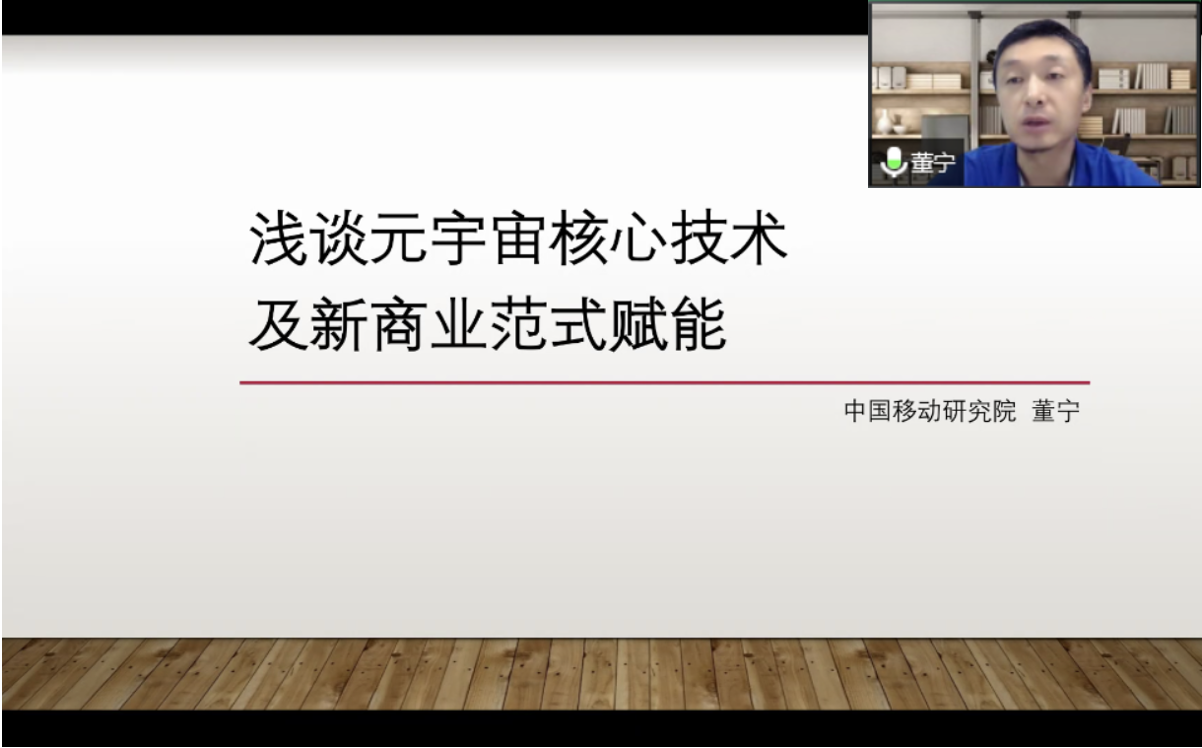
Photo: Expert Dong Ning's keynote speech
Hiromi Komuro, President of the Japan Metaverse International Association, gave a keynote speech on "Development trends, the current situation and the ethical issues facing the Japanese metaverse". Hiromi Komuro pointed out that there were already many people living in metaverse in Japan three years ago. According to research, 90% of people in Japan are aware of XR technology, 12% have used it, 56% want to use it in the future, and 25% plan to use it in next year. Hiromi Komuro said that NFT technology is becoming the focus of attention as a catalyst for the Web 3.0 era, and that Japan has the potential to lead the world in NFT for anime, games, and manga. She concluded that the differences between real life and metaverse life is the type of life, culture and economy.
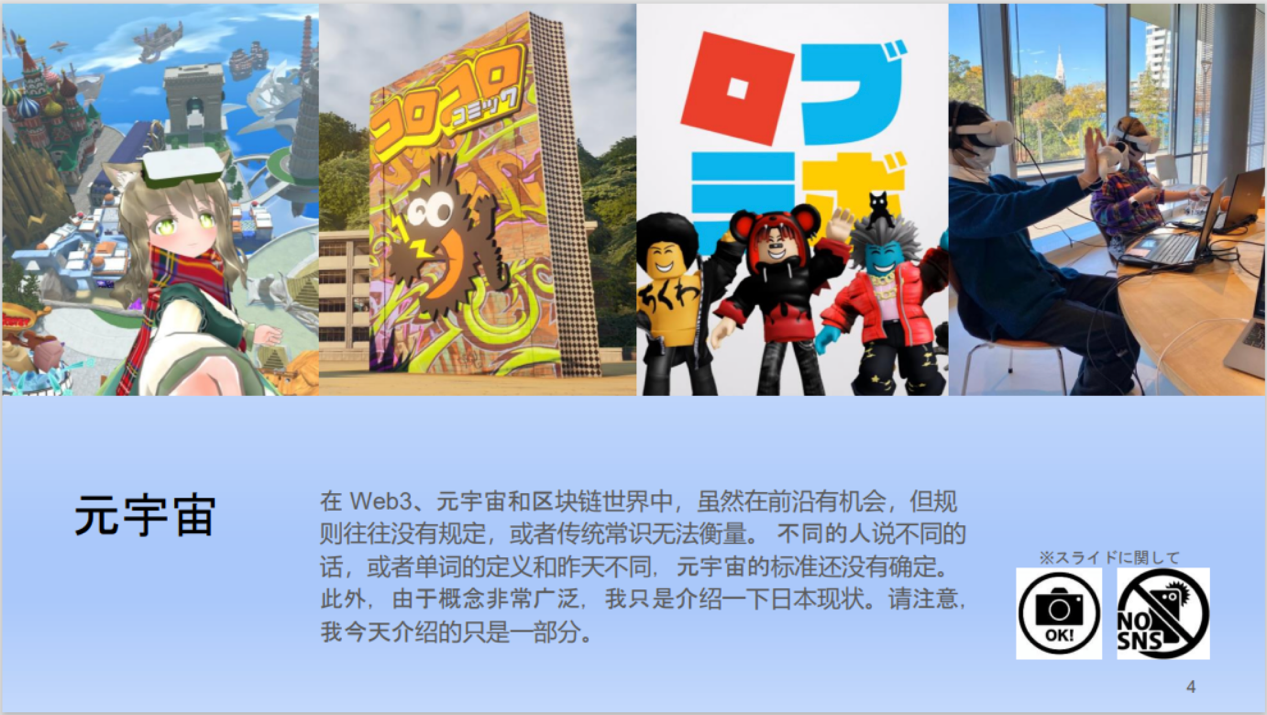
Photo: Keynote speech by Hiromi Komuro, Director
Tian Feng, Director of SenseTime Intelligent Industry Research Institute, delivered a keynote speech on "Metaverse Ethics: The Cultural Challenges of the Digital Generation". Western ethics "virtue and happiness" originated from Aristotle, while Eastern ethics developed from "benevolence, justice, propriety, wisdom and trust" to "innovation, coordination, green, openness and sharing", with the same focus. The focus extends from the ethical relationship between human behavior and human beings to the ethical relationship between human beings and external objects (e.g. technology and the environment such as the metaverse), and proposes an ethical concept of balanced development of the metaverse Tian Feng proposed a "metaverse ethic of balanced development" - sustainable development (to empower real industries), people-centered (to enhance people's happiness) and control over technology (to ensure technological safety). Tian Feng cited the example of tens of millions of primary school students aged 3-12 years old who consume, socialize, learn, and live in the Roblox metaverse today, thus the metaverse has a profound impact on the worldview, values and outlook on life of the alpha generation, also called "digital natives". Finally, Tian Feng proposed seven ethical risks to the sustainability of the metaverse: the productivity time trap; negative virtual idols; digital doubles for evil behaviors; virtual environment entrapment; Deepfake deception; violation of the rights of "people in the middle"; and virtual group cyber violence. With the booming development of the "new industry" in the global metaverse, an efficient combination of "water for fish" and "multi-governance" we will be able to maintain the righteousness, and to act in a way that the new global metaverse is growing.
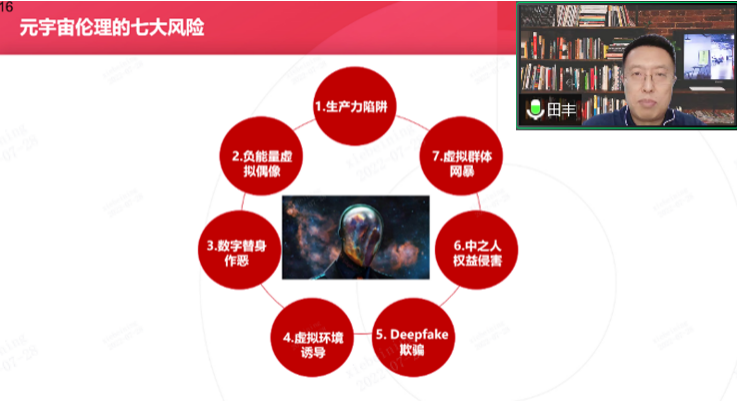
Photo: President Tian Feng's keynote speech
Weng Jialiang, Director of the International Institute of Artificial Intelligence, Singapore, delivered a keynote speech on "A Sustainable Human-Centered Metaverse". Weng's speech was divided into past experiences, present observations and future perspectives of metaverse. He suggested that the game "Second Life" started to build virtual worlds in 2003 and drew two major issues that needed to be addressed in the metaverse: creation tools, community governance and ethics. Weng said that the governance of the metaverse should be divided into four areas: technology, business, influence and governance. He suggested that the combination of Web 3.0 and meta-universe needs to be centered on the UN Sustainable Development Goals (SDGs) and ESG, while the future development trend of meta-universe needs to be viewed from a macro perspective, such as artificial intelligence, the Internet and enterprise software.
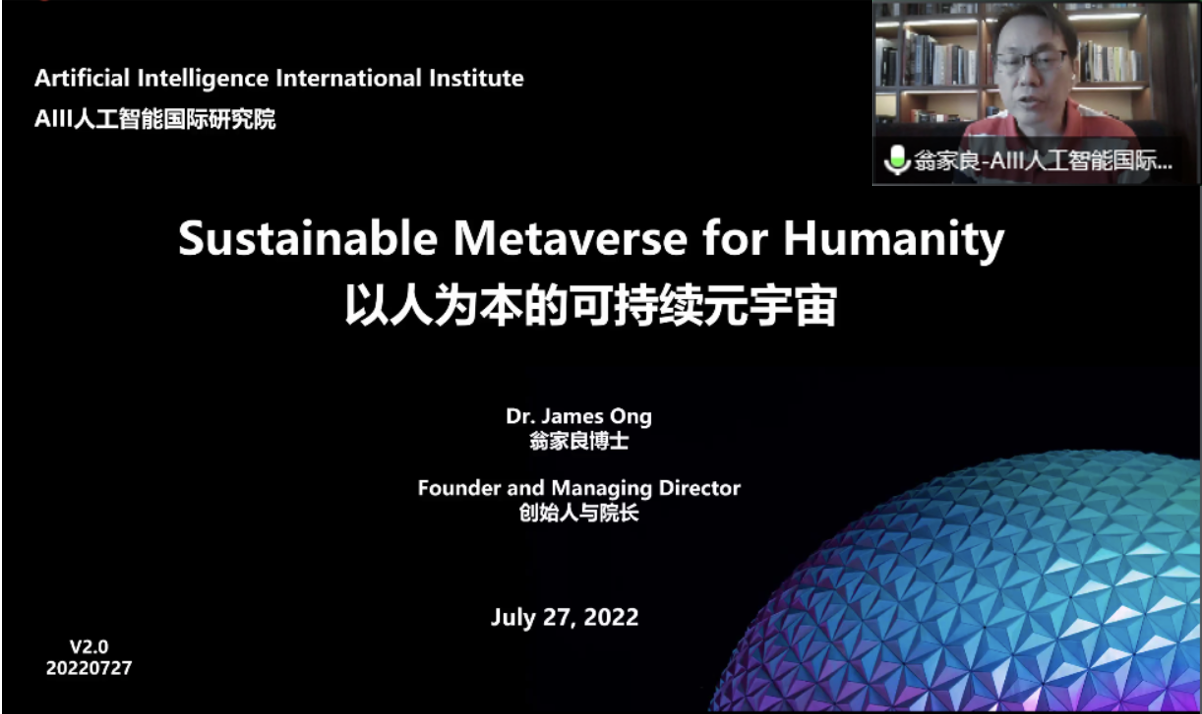
Photo: President Weng Jialiang's keynote speech
After the keynote session, participants discussed and were quizzed on the differences in values between indigenous people, immigrants in the metaverse, and how marginalized groups in the metaverse, such as the elderly, the disabled and low-income groups, can cross the "new digital divide" in the metaverse.






